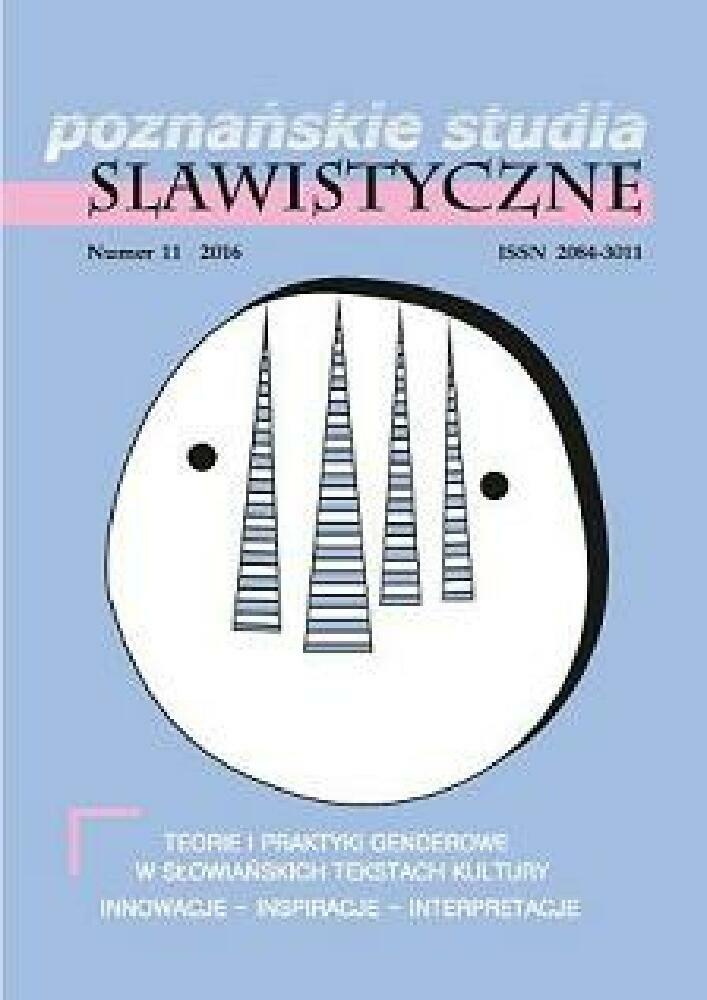Abstract
Archives are important places for researching and reconstructing the past, they lead to discoveries, and they can refute dominant stereotypes. Despite that fact, Serbian feminist scholars have neglected archival research of women writers. In this paper the author points out to resistance of the main Serbian institutions to digitalize archival sources of women writers and indicates some consequences of contemporary feminists’ stance to historical sources. The author directs attention to some important but ignored examples of archival materials in Serbia and Bosnia and Herzegovina. Since they offer informative, significant, and complex account on the past, they can help reconstruct of the South Slavic culture and establish the importance of women writers. KeywordsReferences
Aleksijević V., 1941, Naše žena u književnom stvaranju, „Pro Femina” br. 1, str. 164– –181.
Burton A., 2005. Introduction, u: Archive Stories: Facts, Fiction, and the Writing of History, ur. A. Burton, Durham–London, str. 1–25.
Digitalna Narodna biblioteka Srbije, Srpska bibliografija: knjige 1868–1944, <http://www.digitalna.nb.rs/sf/NBS/Katalozi_i_bibliografije/Srpska_bibliografija__Knjige>, 30.11.2014.
Dujmović S., 2011, Pogledi Jelice Belović-Bernadžikovske iz njene bosanske „Sopstvene sobe”, u: Međunarodna konferencija Bosna i Hercegovina u okviru Austro-Ugarske 1878–1918, Zbornik radova, Sarajevo, str. 481–503.
Eichhorn K., 2013, The Archival Turn in Feminism: Outrage in Order, Philadelphia.
Faludi S., 2010, American Electra: Feminism’s ritual matricide, „Harper’s Magazine”, October, 29–42, <http://susanfaludi.com/americanelectra.pdf>, 30.11.2014.
Fostikov A., Isailović N., 2014, Digital humanities or digital versus humanities, „Pregled Nacionalnog centra za digitalizaciju” br. 24, str. 19–23.
Hawkesworth C., 2000, Voices in the Shadows: Women and Verbal Art in Serbia and Bosnia, New York–Budapest.
Hughson M., 2015, Poluperiferija i rod: pobuna konteksta, Beograd.
„Jelica Belović Bernadžikovska”, Knjiženstvo: teorija i istorija ženske književnosti na srpskom jeziku do 1915. godine, <http://knjizenstvo.etf.bg.ac.rs/sr/authors/jelica-belovic-bernadzikovska>, 30.11.2014.
Narodna biblioteka Srbije, Književni i drugi rukopisi i arhivalije, „Arhiva Vlastoja Aleksijevića”, <https://www.nb.rs/collections/index.php?id=779>, 30.11.2014.
Papić Ž, 2012, Novija feministička kritika patrijarhata: relativizacija univerzalizma, u: Žarana Papić. Tekstovi 1977–2002, ur. A. Zaharijević, Z. Ivanović, D. Duhaček, Beograd, str. 203–233.
Popović L., 2007, Nerešeni problemi iz stručnog rada srpskih arhiva, „Arhiv” br. 1/2, str. 55–63.
Reynolds-Cordileone D., 2008, Colonized and colonizing: The Memoirs of Jelica Belovic-Bernadzikowski, a Croatian Teacher in Bosnia 1896–1908, Vienna.
Stojaković G., 2001, Znamenite žene Novog Sada, knj. 1, ur. G. Stojaković, S. Savić, M. Majkić, Novi Sad.
Tomić S., 2008, The Contributions of Svetolik Ranković to the Structural Development of the Serbian Novel, „Serbian Studies” br. 1, vol. 22, str. 17–35, <http://www.serbianstudies.org/publications/pdf/SS_Vol%2022_2008_No%201-optimized.pdf>, 30.11.2014.
Tomić S., 2011, Dve vrste Pisama iz Soluna: feminističko istraživačko novinarstvo Jelene J. Dimitrijević napram nepouzdanog izveštavanja Branislava Nušića o feminizmu, „Zbornik Matice srpske za književnost i jezik”, knj. 59, sv. 3, Novi Sad, str. 621–639.
Tomić S., 2012, Muške akademske norme i putopisna književnost Jelene J. Dimitrijević, u: Kultura, rod, građanski status, ur. G. Duhaček, K. Lončarević, Beograd, str. 156–175.
Tomić S., 2013a, Prepiska Jelene J. Dimitrijević sa njenim sarajevskim izdavačem Isidorom Đurđevićem, „Zbornik Matice srpske za književnost i jezik”, Novi Sad, kn. 61, sv. 3, str. 705–715, <http://www.maticasrpska.org.rs/wordpress/assets/Knjizevnost%2061_III%20skoro%20kraj.pdf>, 30.11.2014.
Tomić S., 2013b, Šta znači proučavati žene-pisce iz prošlosti?, u Valorizacija razlika. Zbornik radova sa naučnog skupa o Dragi Gavrilović (1854–1917), ur. S. Tomić, Beograd, str. 21–43.
Tomić S. 2013c, Problemi budućih istorija postjugoslavenske književnosti, <http://radio.hrt.hr/ep/suvremena-makedonska-knjizevnost-i-povijesti-postjugoslavenske- -knjizevnosti/47713/>, 30.11.2014.
Tomić S., 2014a, Norma, književnice i istina, specijalni temat Književnost i istina, „Kultura, časopis za teoriju i sociologiju kulture i kulturne politike” br. 143, str. 168–186, <http://scindeks-clanci.ceon.rs/data/pdf/0023-5164/2014/0023-51641443168T.pdf>, 30.11.2014.
Tomić S., 2014b, Obrazovanje i osvajanje građanskog statusa žena: primeri prvih profesionalnih učiteljica-književnica, u: Obrazovanje, rod, građanski status, ur. D. Duhaček, K. Lončarević, D. Popović, Beograd, str. 38–56.
Tomić S., 2014c, Prepiska Milice Janković, „Književna istorija” br. 153, Beograd, str. 679–696.
Tomić S. 2016, Doprinosi nepoznate elite: mogućnosti sasvim drugačije budućnosti, Belgrad. Učiteljski fakultet univerziteta u Beogradu, Antologija srpske knijževnosti <http://www.antologijasrpskeknjiževnosti.rs>, 30.11.2014.
Župan D., 2005, Viša djevojačka škola u Osijeku, „Scrinia Slavonica” br. 5, str. 366– –383.
License
Copyright (c) 2016 Svetlana Tomić

This work is licensed under a Creative Commons Attribution-NoDerivatives 4.0 International License.
